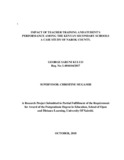| dc.description.abstract | The current educational system is mainly theoretical and examinations oriented. The teaching and learning activities are geared towards making the learner able to respond to examinations and not necessarily creating solutions to problems that hail the nation.
Teachers, on the other hand, are trained to deliver content on the basis of fixed syllabi and cannot deviate from the same. The syllabus is sometimes outdated and has things which are not important to the current generation of technology and innovation. Due to lack of in-service training, the teachers continue to deliver content in a disorganized manner, teacher-centered teaching and not able to link class teaching to the immediate environment so as the students can relate well. The effectiveness of teaching, availability of teaching resources, human resource availability, class size and the distance to nearby schools are also some of the factors that affect students’ academic performance according to past studies.
Due to these disparities in teaching and learning, the students’ academic performance in national examinations has been dwindling and always recording a negative deviation in many places all over the country. In this relation therefore, the study sought to establish the relationship between teacher training and academic performance among students in Kenyan secondary schools case study of Narok County. Many past researches have studied the relationship between attitude and performance, cultural practices and their effects in education, effects of technology and availability of basic school facilities. None of the studies was able to relate teacher training to students’ performance in secondary schools in Kenya.
This study will be very important to educational institutions all over the country, county governments, Ministry of Education (MoE), educational policy makers, school boards of management, school heads, and teachers and also form a baseline for further research on the subject matter. | en_US |



